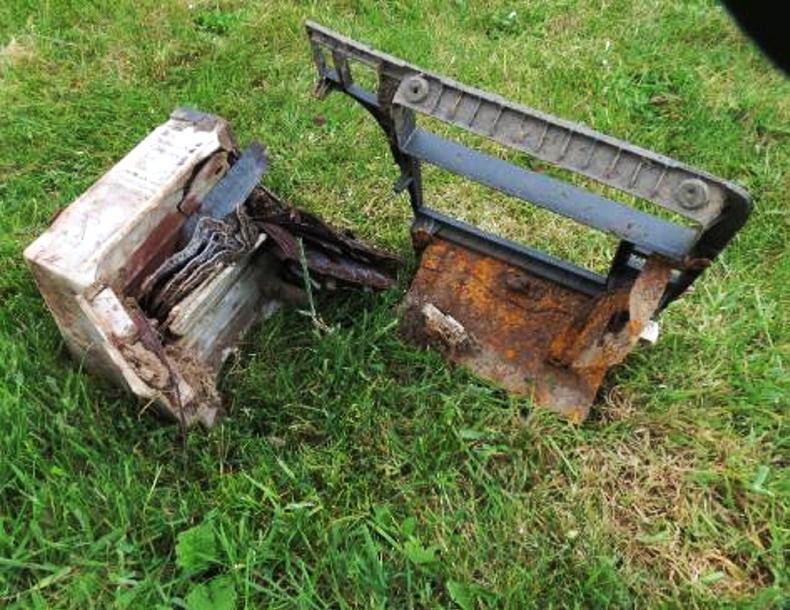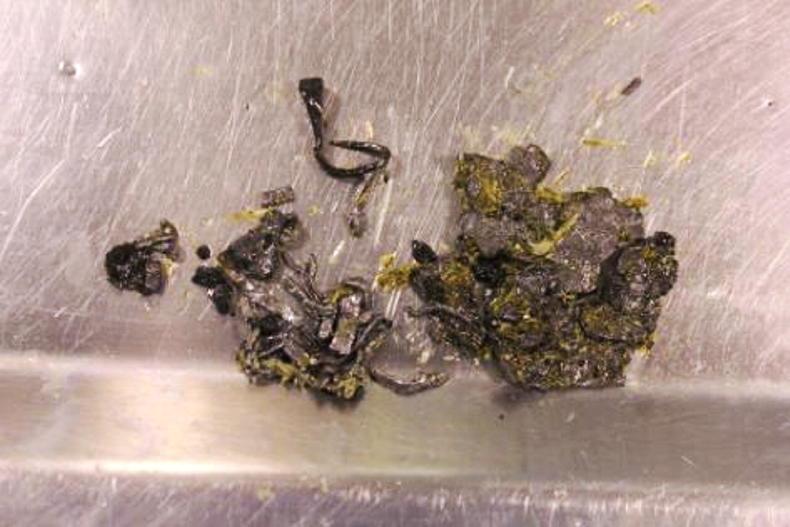Farmers are being urged to check fields and hedgerows for sources of lead, such as old car batteries, before turning cattle out to pasture and before silage making to reduce the risk of lead poisoning in livestock.
The Department of Agriculture has said that hedgerows bounding public roads should be checked carefully for fly-tipping of risk materials.
“Where identified, sources of lead should be removed and disposed of safely. Lead is highly toxic to animals, mainly affecting cattle and sheep, with calves being particularly at risk due to their increased susceptibility and curious nature,” the Department said.
“Catastrophic losses have occurred on occasion, where discarded batteries have been accidentally incorporated into silage and this silage then fed to cattle.

A damaged car or tractor battery is the most common source of lead in cases of lead poisoning in cattle. / Department of Agriculture.
“From a public health perspective lead exposure in milking cattle or beef cattle being readied for slaughter has potential risks for the food chain. To protect the human food chain, cases of lead poisoning are investigated thoroughly, and certain restrictions may be applied,” it added.
The financial loss of animals due to lead poisoning, the Department said, can be substantial for the farmer.
Common sources of lead
Lead batteries, including electric fencing batteriesDiscarded lead flashing and lead pipingBonfire ashOld lead paint tins and flaking lead paintClinical signs
Farmers have been warned that toxicity in livestock can occur within 24 hours of exposure and signs range from sudden death to blindness, ataxia, head pressing and convulsions.

Fragments of a battery found in the stomach of an animal that died from lead poisoning. / Department of Agriculture
“Lead poisoning can often be diagnosed on clinical signs and finding a source of lead to which the animals had access. Measurement of lead concentrations in tissue or blood by your local Department regional veterinary laboratory, on referral by your vet, will confirm the diagnosis,” it added.
Farmers are being urged to check fields and hedgerows for sources of lead, such as old car batteries, before turning cattle out to pasture and before silage making to reduce the risk of lead poisoning in livestock.
The Department of Agriculture has said that hedgerows bounding public roads should be checked carefully for fly-tipping of risk materials.
“Where identified, sources of lead should be removed and disposed of safely. Lead is highly toxic to animals, mainly affecting cattle and sheep, with calves being particularly at risk due to their increased susceptibility and curious nature,” the Department said.
“Catastrophic losses have occurred on occasion, where discarded batteries have been accidentally incorporated into silage and this silage then fed to cattle.

A damaged car or tractor battery is the most common source of lead in cases of lead poisoning in cattle. / Department of Agriculture.
“From a public health perspective lead exposure in milking cattle or beef cattle being readied for slaughter has potential risks for the food chain. To protect the human food chain, cases of lead poisoning are investigated thoroughly, and certain restrictions may be applied,” it added.
The financial loss of animals due to lead poisoning, the Department said, can be substantial for the farmer.
Common sources of lead
Lead batteries, including electric fencing batteriesDiscarded lead flashing and lead pipingBonfire ashOld lead paint tins and flaking lead paintClinical signs
Farmers have been warned that toxicity in livestock can occur within 24 hours of exposure and signs range from sudden death to blindness, ataxia, head pressing and convulsions.

Fragments of a battery found in the stomach of an animal that died from lead poisoning. / Department of Agriculture
“Lead poisoning can often be diagnosed on clinical signs and finding a source of lead to which the animals had access. Measurement of lead concentrations in tissue or blood by your local Department regional veterinary laboratory, on referral by your vet, will confirm the diagnosis,” it added.











SHARING OPTIONS